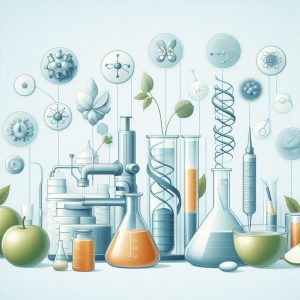The beauty industry is witnessing a profound transformation driven by advancements in science and technology. Among the emerging innovations, precision fermentation stands out as a revolutionary approach with the potential to redefine product development processes. While precision fermentation has long been associated with food production, its application in the beauty industry is garnering increasing attention.
Here, we discuss precision fermentation and its implications for the beauty sector. From its fundamental principles to practical applications, we shed light on how this cutting-edge technology is reshaping the landscape of beauty product innovation.
Understanding Precision Fermentation
Precision fermentation represents a paradigm shift in the way valuable compounds are produced. At its core, precision fermentation involves the cultivation of microorganisms—such as bacteria, yeast, or fungi—in a controlled environment to generate specific molecules. Unlike traditional fermentation methods that rely on agricultural crops or natural resources, precision fermentation harnesses the power of biotechnology to engineer microorganisms capable of synthesizing desired cosmetic ingredients.
The process begins with the selection of suitable microorganisms, followed by genetic modification to enhance their metabolic pathways. These genetically engineered microorganisms are then cultivated in bioreactors under precisely controlled conditions, including temperature, pH, oxygen levels, and nutrient availability. This controlled environment ensures optimal growth and productivity, resulting in high yields of target compounds.
One of the key advantages of precision fermentation is its versatility. By manipulating the genetic code of microorganisms, scientists can program them to produce a wide range of molecules, from vitamins and amino acids to enzymes and bioactive compounds. This includes various peptides – and of course collagen and elastin. This versatility enables the production of complex ingredients that may be difficult or impractical to obtain through traditional methods. Precision fermentation allows for cruelty-free, vegan collagen like Geltor’s Caviance.
Moreover, precision fermentation offers several advantages over conventional production processes. Unlike agricultural cultivation, which is subject to factors such as climate, soil quality, and seasonal variations, precision fermentation provides a controlled and predictable manufacturing environment. This consistency in production allows for greater reliability and reproducibility in product formulations.
Furthermore, precision fermentation offers significant sustainability benefits. By eliminating the need for large-scale farming and resource-intensive extraction processes, it reduces the environmental footprint associated with ingredient production. Additionally, the efficient use of raw materials and reduced waste generation contribute to a more sustainable supply chain.
Overall, precision fermentation represents a game-changer for the beauty industry, offering innovative solutions for ingredient sourcing, product development, and sustainability. In the following sections, we’ll explore the diverse applications of precision fermentation in beauty product formulation and highlight the transformative potential of this technology.
Applications of Precision Fermentation in the Beauty Industry

Precision fermentation offers a myriad of applications in the beauty industry, revolutionizing the way skincare products, haircare, and cosmetic products are formulated and manufactured. Let’s explore some of the key areas where this innovative technology is making an impact:
1. Sustainable Ingredient Production
One of the most significant advantages of precision fermentation in the beauty industry is its potential to produce sustainable ingredients. Traditional methods of sourcing cosmetic ingredients often involve extensive land use, water consumption, and environmental degradation. In contrast, precision fermentation allows for the production of high-quality ingredients in a controlled lab environment, minimizing the ecological footprint associated with conventional agriculture.
2. Novel Active Ingredients
By harnessing the power of genetic engineering, precision fermentation enables the production of novel active ingredients with enhanced efficacy and functionality. Microorganisms can be engineered to biosynthesize specific compounds, such as peptides, enzymes, or antioxidants, that offer targeted skincare benefits. These bioactive molecules can address various skin concerns, including aging, hyperpigmentation, and inflammation, leading to the development of more effective and innovative beauty formulations.
3. Customized Beauty Products
Another exciting application of precision fermentation is the customization of beauty products to meet individual needs and preferences. With advances in biotechnology and data analytics, cosmetics companies can analyze genetic and environmental factors to create personalized skincare and haircare solutions tailored to each consumer’s unique biology and lifestyle. This personalized approach not only enhances product efficacy but also fosters consumer engagement and brand loyalty.
4. Natural and Clean Beauty
Consumers are increasingly seeking natural and clean beauty products free from synthetic chemicals and harmful additives. Precision fermentation offers a sustainable and eco-friendly alternative to traditional ingredient sourcing, aligning with the growing demand for clean beauty formulations. By producing ingredients through fermentation, companies can ensure product purity and transparency while meeting the stringent standards of clean beauty certifications.
5. Biofabricated Materials
Beyond skincare and cosmetics, precision fermentation holds promise for the development of biofabricated materials used in beauty packaging and accessories. Microorganisms can be engineered to produce biodegradable polymers, such as PHAs (polyhydroxyalkanoates) or bioplastics, that offer a sustainable alternative to conventional plastics. These bio-based materials not only reduce plastic waste but also contribute to the circular economy within the beauty industry.
Benefits of Precision Fermentation in Beauty Products

The integration of precision fermentation in beauty product development offers a multitude of benefits for both consumers and manufacturers. Let’s explore some of the key advantages:
1. Enhanced Sustainability
By reducing reliance on traditional agricultural practices and minimizing resource consumption, precision fermentation promotes environmental sustainability within the beauty industry. The controlled production of ingredients in bioreactors significantly reduces land use, water usage, and greenhouse gas emissions associated with conventional farming, leading to a more eco-friendly supply chain.
2. Consistent Quality and Purity
Unlike natural ingredients sourced from plants or animals, ingredients produced through precision fermentation offer unparalleled consistency and purity. The controlled fermentation process ensures uniformity in product quality, eliminating variations caused by factors such as climate, soil conditions, or seasonal changes. This consistency enables manufacturers to deliver reliable and high-performing beauty products to consumers.
3. Innovation and Customization
Precision fermentation fuels innovation in beauty product formulation, allowing for the creation of novel ingredients and formulations that address specific skin concerns and consumer preferences. By leveraging biotechnology and data-driven insights, companies can develop customized skincare and haircare solutions tailored to diverse skin types, ethnicities, and lifestyles. This innovative approach drives product differentiation and consumer engagement in a competitive market.
4. Ethical and Cruelty-Free
As a cruelty-free alternative to animal-derived ingredients, precision fermentation aligns with ethical and sustainable practices in the beauty industry. By producing ingredients through microbial fermentation, companies can avoid animal testing and reduce reliance on animal-derived substances, ensuring that products are ethically sourced and cruelty-free. This commitment to animal welfare resonates with conscientious consumers who prioritize ethical and transparent brands.
5. Future-Proofing Supply Chains
With growing concerns about climate change, resource scarcity, and biodiversity loss, precision fermentation offers a resilient and future-proof solution for beauty product manufacturing. By decoupling ingredient production from traditional agriculture, companies can mitigate risks associated with climate-related disruptions, such as extreme weather events, crop failures, or supply chain disruptions. This resilience strengthens the sustainability and resilience of beauty supply chains in an uncertain world.
Challenges and Future Prospects
While precision fermentation holds immense promise for the beauty industry, it also faces certain challenges and considerations that must be addressed for widespread adoption and continued success:
1. Regulatory Framework
One of the primary challenges facing precision fermentation in the beauty industry is navigating regulatory frameworks governing the use of genetically modified organisms (GMOs) and novel ingredients. Regulatory agencies require rigorous safety assessments and approval processes for new ingredients produced through biotechnology, which can be time-consuming and resource-intensive for companies. Establishing clear guidelines and standards for the evaluation and approval of fermented ingredients is essential to foster innovation while ensuring consumer safety.
2. Consumer Acceptance
Consumer acceptance and perception of precision-fermented ingredients may also influence the adoption of this technology in beauty products. While many consumers embrace innovation and sustainability, some may express concerns about the safety, efficacy, and naturalness of ingredients produced through genetic engineering. Educating consumers about the science behind precision fermentation and its benefits for sustainability, efficacy, and safety is crucial to building trust and fostering acceptance in the marketplace.
3. Cost and Scale-Up
The cost of production and scale-up of precision-fermented ingredients can present challenges for companies, particularly startups and small-scale manufacturers. While the technology offers long-term cost savings and environmental benefits, initial investment in research, development, and infrastructure may be prohibitive for some companies. Additionally, scaling up production to meet commercial demand while maintaining product quality and consistency requires careful optimization and investment in manufacturing capabilities.
4. Technological Advancements
Continued technological advancements in fermentation processes, genetic engineering, and bioreactor design are essential to unlocking the full potential of precision fermentation in the beauty industry. Innovations such as automated bioreactor systems, synthetic biology tools, and machine learning algorithms can enhance efficiency, productivity, and scalability while reducing costs and time to market. Collaborations between biotechnology companies, academic researchers, and beauty manufacturers can drive innovation and accelerate the development of next-generation beauty products.
5. Market Dynamics
The evolving landscape of the beauty industry, including shifting consumer preferences, emerging trends, and competitive dynamics, influences the adoption and commercialization of precision-fermented ingredients. Companies must stay abreast of market trends and consumer insights to identify opportunities for product innovation and differentiation. Strategic partnerships, brand collaborations, and marketing initiatives can help companies leverage the unique selling propositions of precision-fermented beauty products and capture market share.

Conclusion: Embracing Precision Fermentation in Beauty Industry
As the beauty industry continues to evolve, driven by advancements in science, technology, and consumer preferences, precision fermentation emerges as a transformative force shaping the future of product development and sustainability. By harnessing the power of microbial fermentation and genetic engineering, companies can create innovative, sustainable, and efficacious beauty products that meet the evolving needs and values of consumers.
While challenges such as regulatory hurdles, consumer acceptance, and cost considerations remain, the potential benefits of precision fermentation—from enhanced sustainability and customization to ethical sourcing and future-proofing of supply chains—underscore its importance as a catalyst for positive change in the beauty industry.
As companies embrace this innovative technology and collaborate to overcome challenges, the beauty industry stands poised to unlock new opportunities for creativity, sustainability, and market growth. By embracing precision fermentation, we can redefine beauty standards, drive innovation, and create a more sustainable and inclusive beauty ecosystem for generations to come.
Precision Fermentation in Beauty Industry References
Fermentation for future food systems – PMC